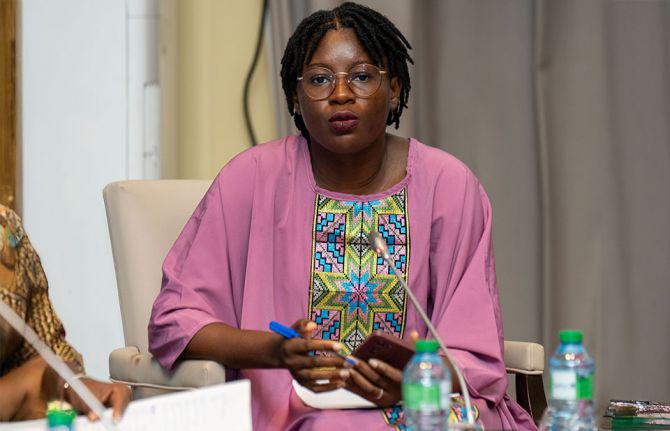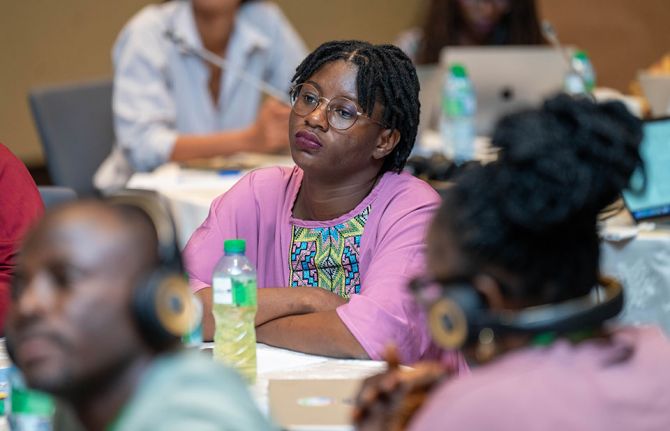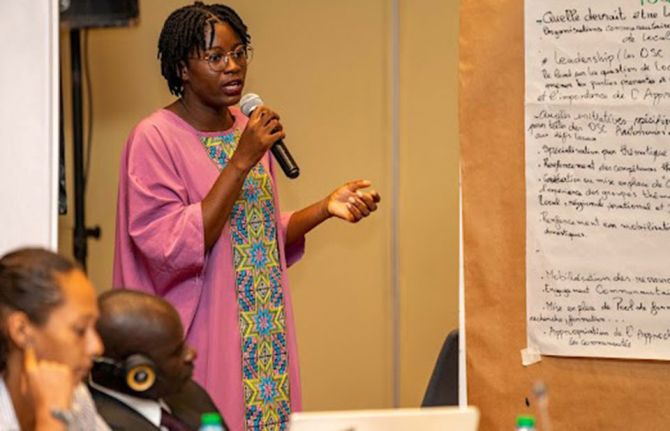



Feature Story
Empowering youth to lead Togo’s HIV response
31 October 2024
31 October 2024 31 October 2024In Togo, youth and adolescents living with HIV are stepping forward to lead the response against the AIDS epidemic. Through resilience, determination, and a collective vision, they have come together to form a new youth-led network called the Network of Positive Children, Adolescents and Youth Innovating for Renewal (REAJIR+), This grassroots initiative is dedicated to amplifying the voices of all children, adolescents and young people affected by HIV, and is a testament to the power of youth leadership in shaping their future. “We felt the need to create a space where young people living with HIV could be heard and represented,” says Sitsope Adjovi Husunukpe, Executive Director and one of the founding members of the network. “Many of us felt that our needs and concerns, although important, were not given priority in the development and implementation of policies and interventions relating to HIV prevention and care.”
The network’s creation was not without problems. In Togo, where leadership is often adult-driven, it took courage and determination to establish an organization run by and for young people. "Even though we faced difficulties, we knew we had to persist," explains Adjovi. "The environment wasn’t always supportive, but we kept believing in the vision of our network. We wanted to ensure that young people living with HIV, from all walks of life, had a space to advocate for their rights."
The need for young people to be involved in the response to HIV in Togo is clear. According to recent reports, only about 26% of young people aged 15-24 have enough knowledge about how to prevent HIV.[1] Children's performance in terms of adherence to HIV treatment is below the general average of 80.5%[2]. At the same time, 6,200 children aged 0 to 14 are living with HIV[3]. In Western and Central Africa, at least 16% of girls and 12% of boys aged 15-24 have sex before they turn 15[4]. These numbers show that more needs to be done to help young people understand HIV to protect themselves.
“Empowering young people goes beyond raising awareness; it’s about unlocking their potential to drive change. When they take ownership of their advocacy, they become catalysts for progress, shaping solutions that resonate in their communities. By equipping them with the right tools, we invest in a future led by those who understand the challenges firsthand.” says Dr Yayé Kanny Diallo, UNAIDS Country Director for Togo and Benin.
Koffi Emmanuel Hounsime, the network’s president, echoes the importance of youth-led advocacy. “At the beginning, people questioned our legitimacy. They asked, ‘Who are you representing?’ But once we formalized our network and built our credibility, we gained respect. Now, when we speak, we speak with authority on behalf of youth living with HIV across the country.”
Despite these hurdles, the network remains committed to its mission. “We are working not just for ourselves but for the future generation of young people living with HIV,” says Adjovi. "We want to ensure that we have better support, better care improving our life quality, and that we feel empowered to take decisions concerning our own well-being."
The network has already made significant strides. It has actively participated in national HIV dialogues and contributed to the development of the new Global Fund HIV grant, ensuring that the priorities of adolescents and young people are included.
For these young leaders, creating the network is about more than just advocacy. It’s about survival, empowerment, and hope. Emmanuel reflects, “We didn’t just create this network to represent young people, we created it to change lives. Every day, we’re working to make sure that no young person living with HIV feels alone.”
[1] AIDS INFO Togo Country Data
[2] Rapport REDES Togo 2023
[3] AIDS Info Togo Country Data
[4] UNESCO Education Report



